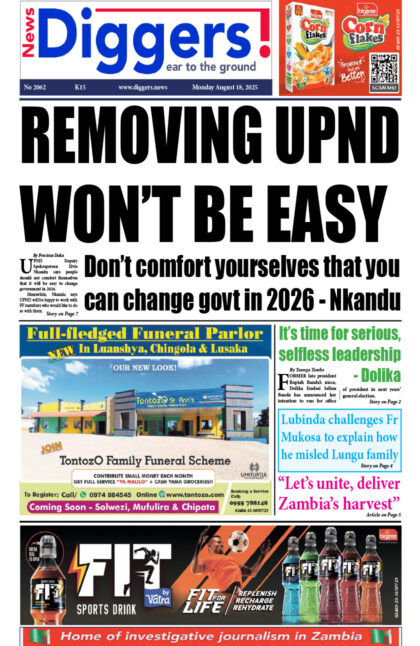Economist Chibamba Kanyama has asked government to withdraw the Health Insurance Bill until the country’s economy records a healthy growth to support the numerous taxes that Zambians are already overburdened with.
Reacting to the Health Insurance Bill that past second reading in Parliament last week, Kanyama who is also a financial consultant and managing partner at Bridges Limited, said in a statement that government needed to take up the responsibility of sustaining the livelihoods of unemployed citizens, rather than leaving the obligation to be covered by the taxes of those in the formal sector.
“My submission is that Zambians are currently not in a position to absorb all these various taxes and levies within a short time. There already exists a tax that government never recognizes but goes a long way in mitigating government expenditure: This is the social burden tax where the working class support many unemployed youths and the extended families. This is a tax because ordinarily, government has the responsibility of sustaining the livelihoods of the unemployed,” he said.
“If Government has to introduce new levies such as medical insurance, let it be done when the economy itself registers a healthy growth rate (of more than 7 percent per year) or introduce it in 2023 – giving this five year window to prepare citizens and the Health Insurance Authority itself. By the way, we have too many Authorities in this country and all of them have various levies to users through which they support the central account (99).”
He added that the government was expected to seal loopholes in the management of public resources and prove that the taxes already being payed by citizens were not being abused by those in government, as shown in the Auditor General’s report.
“In addition, Government needs its own window to seal existing loopholes of financial abuse to public funds as shown by the Auditor General. The pilfered and mismanaged funds come from the existing taxes. There has to be evidence that the taxes already payed by citizens are properly managed. Let us demonstrate capacity for accountability and transparency before we embark on Health Insurance that will be a huge burden to Zambians already paying various taxes. Health Insurance itself is difficult to run: easy to collect the money but nearly impossible to implement when systems are not robust and transparent.”
Kanyama went further to explain where the government was drawing the idea of the Health Insurance Bill.
“Following the 2014-2016 economic crisis that hit our country, government, through advice from international organizations, has been focused on balancing the country’s books. The approach has been about raising significant domestic revenues while at the same time rationalising expenditures by removing subsidies,” he said.
“The government is now introducing cost-reflective service provision (or user-fees). The price of energy (fuel and electricity) has been adjusted upwards by the removal of subsidies. Motorists also pay road tolls in addition to the existing fuel levy. One headache for government has been medical expenses for the citizens (as the average cost of medical fees per citizen is well over K4000/annum. Hence the introduction of health insurance that will levy every collectible user, including minibuses (as a collection point).”
He said government was forcing citizens to pay more than they were capable of, in a bid to support the budget.
“In effect, government is working on what economists call, ‘fiscal consolidation’ by ensuring citizens pay more above what they are already paying (they already pay various levies, PAYE, import duties, VAT, road tolls, withholding taxes (recently introduced) fuel levy etc). This is to ensure the budget is not under pressure.”
























